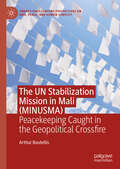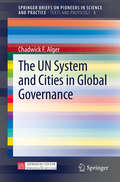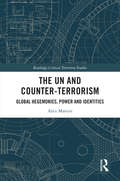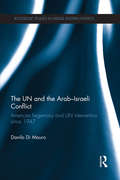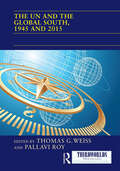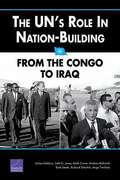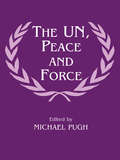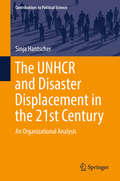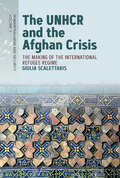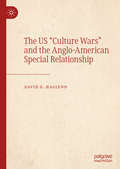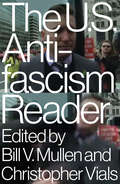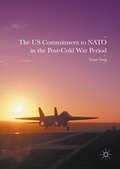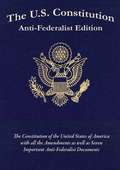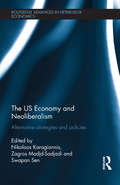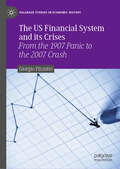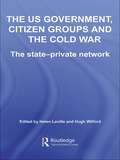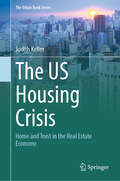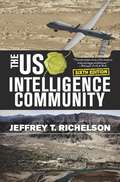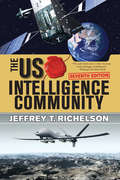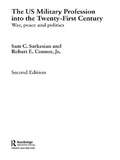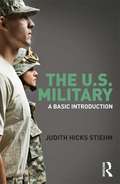- Table View
- List View
The UN Stabilization Mission in Mali: Peacekeeping Caught in the Geopolitical Crossfire (Twenty-first Century Perspectives on War, Peace, and Human Conflict)
by Arthur BoutellisThe book tells (and analyzes) the story of the United Nations multidimensional stabilization operation in Mali (MINUSMA), which closed at the end of the 2023 after almost a decade of existence. MINUSMA, which is the UN operation that has by far attracted the most media attention, has been the laboratory of contemporary peacekeeping, combining several interesting elements. It came on the tail of a French-African military intervention (rehatting African contingents), operated ‘in parallel’ to various counterterrorism forces (Barkhane and JF G5 Sahel). It has been the deadliest peace operation due to asymmetric threats but has also managed to adapt to a new environment and has witnessed a ‘return’ of European troop contributors to peacekeeping in Africa but also a significant contribution from China. Most importantly, MINUSMA ultimately became caught in the geopolitical crossfire, with a host government led by a military junta and supported by Russia (and the Wagner Group) defying the Security Council, in the context of a return of East-West rivalries exacerbated by the 2022 Ukraine invasion.
The UN System and Cities in Global Governance
by Chadwick F. AlgerThis is the second volume to commemorate the 90th birthday of the distinguished scholar Chadwick F. Alger to honor his lifetime achievement in international relations and as President of the International Studies Association (1978-1979). After a brief introduction by Chad F. Alger this volume presents six of his key texts on The UN System and Cities in Global Governance, focusing on "Cities as arenas for participatory learning in global citizenship"; "The Impact of Cities on International Systems"; "Perceiving, Analysing and Coping With the Local-Global Nexus"; "The World Relations of Cities: Closing the Gap Between Social Science Paradigms and Everyday Human Experience"; "Japanese Municipal International Exchange and Cooperation in the Asia-Pacific: Opportunities and Challenges" and on "Searching for Democratic Potential in Emerging Global Governance: What Are the Implications of Regional and Global Involvements of Local Governments?".
The UN and Counter-Terrorism: Global Hegemonies, Power and Identities (Routledge Critical Terrorism Studies)
by Alice MartiniThis book traces the evolution of the UN Security Council’s actions against counter-terrorism and extremism. The work examines the progression of the UN Security Council’s fight against international terrorism and its development of practices to prevent radicalisation and extremism. It also looks at the consequences of these processes and how they have deeply moulded global counter-terrorism. The book looks at the discursive construction of a global threat and tracks how this construction evolved in relation to the Council’s establishment of legal practices and bodies, and by its Members’ discourses. It argues that the very specific definition the Council provided on international terrorism in the 2000s is profoundly shaped by global hegemonies, relations of power shaping the international community, and its own identity. To demonstrate this, it offers a long genealogical perspective of the structure of the UN since the 1930s and then focuses specifically on the developments taking place in the 2000s. The book thus looks at the Security Council’s fight against international terrorism as a global, globalised, and globalising enterprise. This book will be of much interest to students of critical terrorism studies, security studies, global governance and International Relations.
The UN and the Arab-Israeli Conflict: American Hegemony and UN Intervention since 1947 (Routledge Studies in Middle Eastern Politics)
by Danilo Di MauroThis book provides a comprehensive empirical analysis of the United Nations intervention in the Arab-Israeli conflict since 1947. In his structured and exhaustive analysis, the author presents a long term perspective on the UN intervention in the conflict and explains its evolution during the last sixty years. He draws on a wealth of quantitative data to provide a complete picture of resolutions addressed to the Arab-Israeli conflict by the General Assembly and the Security Council, the mediation activity, and the UN peace missions in the area. Through his analysis, Di Mauro addresses such questions as: Why did the United Nations have different involvement and efforts of interventions in the conflict? How did the role of the UN change during the dispute, and why did it change? Is there still a role for the UN in the Palestinian-Israeli peace process? Offering a contribution to both to the studies of UN intervention in conflict resolution and, more broadly, to the UN role in the international system, The UN and the Arab-Israeli Conflict will be of great interest to International Relation scholars and students, but also appreciable by historians, political scientists, methodologists and all the social scientists interested in the Palestine question and the United Nations.
The UN and the Global South, 1945 and 2015 (ISSN)
by Thomas G. Weiss Pallavi RoyThere is a woeful neglect of the current United Nations in the academic and policy literatures, and so it is unsurprising that an examination of that multilateral structure before 1945 shows an even more egregious absence of analytical attention. Such ignorance conveniently ignores the forgotten genius of 1942–1945, namely in the wide substantive and geographic relevance of multilateralism during the World War II and in the foundations for the contemporary world order. The wartime and immediate post-war United Nations was not simply dictated by the US State Department, Whitehall, and the foreign ministries of the West—even a generation before decolonisation had proceeded apace and two-thirds of UN member states moved into the limelight as erstwhile colonies. These essays interrogate the extent to which anti-colonialists and other nationalists resisting imperial rule embraced the promise of a rule-based world order as a normatively and operationally valuable projection in 1945. They critically review the worlds of 1945 and 2015, of then and now, to determine the role of continuity and change, of the continuing bases for compromise and for the clashes between the Global South and North. This book was previously published as a special issue of Third World Quarterly.
The UN's Role in Nation-Building: From the Congo to Iraq
by James Dobbins Keith Crane Andrew Rathmell Brett Steele Seth G. JonesReviews UN efforts to transform eight unstable countries into democratic, peaceful, and prosperous partners, and compares those missions with U.S. nation-building operations. The UN provides the most suitable institutional framework for nation-building missions that require fewer than 20,000 men-one with a comparatively low cost structure, a comparatively high success rate, and the greatest degree of international legitimacy.
The UN, Peace and Force
by Michael PughRestoring and maintaining peace within war-torn societies is a relatively new task for the United Nations. This book examines the options for the UN in the use of force to secure peace, and the extent to which peacekeeping can be effectively extended to coerce warring factions. A combination of internationally distinguished academics and new scholars at the forefront of research are represented, making an important contribution to the debate about the role of international military operations in the maintenance of international peace and security.
The UNHCR and Disaster Displacement in the 21st Century: An Organizational Analysis (Contributions to Political Science)
by Sinja HantscherThis book offers an in-depth case study on the leading international refugee agency, the United Nations High Commissioner for Refugees (UNHCR), and its approach to environmentally displaced persons. The author examines the UNHCR on the basis of expert interviews and content analysis in order to highlight why and how the organization is addressing the issue. The analysis draws on organizational as well as security theory, offering readers a better understanding of the connection between the two. The book appeals to scholars in the fields of migration and organizational studies, as well as policymakers and professionals working in international organizations.
The UNHCR and the Afghan Crisis: The Making of the International Refugee Regime (Humanitarianism and Security #3)
by Giulia ScalettarisToday the UNHCR is present in more than 130 countries and takes care of some 90 million people. This book looks at how it is deployed and who its agents are. By taking the reader through the offices in charge of the Afghan refugee crisis during the 2000s, in Geneva and in Kabul, the book shows the internal functioning of this international organization. It provides analysis of Afghan refugee policies from an original position, with the author being both agency official and anthropologist, and articulates multiple levels of analysis: the micropolitics of practices as much as the institution and the multi-scalar power relations that shape its environment.
The UNHCR and the Supervision of International Refugee Law
by James C. SimeonThe 1951 Convention relating to the Status of Refugees, and its 1967 Protocol, and many other important international instruments recognize the unique role the UNHCR plays in protecting refugees and supervising international refugee law. This in-depth analysis of the UNHCR's supervisory role in the international refugee protection regime examines the part played by key institutions, organizations and actors in the supervision of international refugee law. It provides suggestions and recommendations on how the UNHCR's supervisory role can be strengthened to ensure greater State Parties' compliance to their obligations under these international refugee rights treaties, and contributes to enhancing the international protection of refugees and to the promotion of a democratic global governance of the international refugee protection regime.
The US "Culture Wars" and the Anglo-American Special Relationship
by David G. HaglundThis book discusses “culture” and the origins of the Anglo-American special relationship (the AASR). The bitter dispute between ethnic groups in the US from 1914–17—a period of time characterized as the “culture wars”—laid the groundwork both for US intervention in the European balance of power in 1917 and for the creation of what would eventually become a lasting Anglo-American alliance. Specifically, the vigorous assault on English “civilization” launched by two large ethnic groups in America (the Irish-Americans and the German-Americans) had the unintended effect of causing America’s demographic majority at the time (the English-descended Americans) to regard the prospect of an Anglo-American alliance in an entirely new manner. The author contemplates why the Anglo-American “great rapprochement” of 1898 failed to generate the desired “Anglo-Saxon” alliance in Britain, and in so doing features theoretically informed inquiries into debates surrounding both the origins of the war in 1914 and the origins of the American intervention decision nearly three years later.
The US Antifascism Reader
by Bill V. Mullen Christopher VialsHow anti-fascism is as American as apple pieSince the birth of fascism in the 1920s, well before the global renaissance of &“white nationalism,&” the United States has been home to its own distinct fascist movements, some of which decisively influenced the course of US history. Yet long before &“antifa&” became a household word in the United States, they were met, time and again, by an equally deep antifascist current. Many on the left are unaware that the United States has a rich antifascist tradition, because it has rarely been discussed as such, nor has it been accessible in one place. This reader reconstructs the history of US antifascism into the twenty-first century, showing how generations of writers, organizers, and fighters spoke to each other over time. Spanning the 1930s to the present, this chronologically-arranged, primary source reader is made up of antifascist writings by Americans and by exiles in the US, some instantly recognizable, others long-forgotten. It also includes a sampling of influential writings from the US fascist, white nationalist, and proto-fascist traditions. Its contents, mostly written by people embedded in antifascist movements, include a number of pieces produced abroad that deeply influenced the US left. The collection thus places US antifascism in a global context.
The US Commitment to NATO in the Post-Cold War Period
by Yanan SongThis book examines the continuing US commitments to NATO in the post-Cold War era. The initial focus is on the recommitment decisions of the Clinton administration. It also extensively explores the US operations in Kosovo, Afghanistan and, in particular, Libya. The case study on Libya is especially important in exploring the Obama administration s understanding of the purpose of NATO in the context of current economic pressures, domestic US debates about post-War on Terror interventions, and of increasing American preoccupation with Pacific rather than European security. The author utilises substantial archival research and interviews with policymakers and academics, including Ambassador Kethleen Stephens, former Special Assistant to the President Stephen J. Flanagan, and former Director for Non-proliferation at National Security Council Robert S. Litwak. This book is ideal for postgraduate researchers and academics in US foreign policy, foreign policy decision-making, transatlantic relations and NATO, as well as a great use to undergraduate students. "
The US Congress for Kids: Over 200 Years of Lawmaking, Deal-Breaking, and Compromising, with 21 Activities
by Henry Waxman Ronald A. Reis Kristi NoemAn interactive guidebook to the history and inner workings of the legislative branch of the U.S. Government Providing a historical perspective on all that is going on today, US Congress for Kids examines the major milestones in congressional history, including the abolition of slavery, extending the vote to African Americans and to women, and investigating misconduct in both government and private institutions. Kids will be engaged by the focus on dramatic stories, personalities, and turning points while also benefitting from the clear discussions of Congressional purpose, structure, history, and ongoing issues. Educational, hands-on activities that illuminate the workings of the U.S. Congress include making a House ceremonial mace, creating congressional money, making a capitol dome, and designing a Congressional Medal of Honor.
The US Constitution Anti-Federalist Edition
by VariousCollected here in one volume is the United States Constitution, with all of the Amendments, and seven important Ant-Federalist papers by writers such as Patrick Henry, Samuel Adams, and George Clinton. The Anti-Federalists were opposed to a strong federal government. They were concerned that if too much power was given to the federal government, states' rights would necessarily be eroded.
The US Constitution: A Pocket Reference
by Power Think PublishingThis is the most comprehensive "pocket" edition on the United States Constitution. This 96 page reference fits nicely in your pocket for quick, convenient access. <p><p> Contents Included in this Handy Pocket Reference: <p> The Complete Constitution of the United States - Preamble and 7 Articles - The Bill of Rights and All Other Amendments - In Convention Monday, Sept. 17th, 1787 (Presentation of the Constitution before Congress) - Congress of the United States Sept. 25, 1797 (The Presentation of the First 12 Amendments to the Legislatures) <p>A Brief History of the US Constitution - Introduction, Articles of Confederation, The Delegates, The Virginia Plan, The New Jersey Plan, Hamilton's Plan, <p>The Great Compromise, The First Draft, The Federalists & Anti-Federalists, Ratification, The Bill of Rights, The Document Enshrined. <p>The Declaration of Independence Questions and Answers Pertaining to the Constitution (over 80 Questions & Answers covering the key points of the Constitution) <p>Famous Quotes from the Founders
The US Economy and Neoliberalism: Alternative Strategies and Policies (Routledge Advances in Heterodox Economics)
by Nikolaos Karagiannis Zagros Madjd-Sadjadi Swapan SenIn recent times, policy makers, scientists, academics and commentators have become increasingly nervous about the US economic downturn. Discussions have centred around the range and magnitude of the country’s socio-economic problems, its vexing production decline and its unsatisfactory macroeconomic performance, which give rise to the following questions: what are the sources of this recent downfall? And can this situation be reversed by pursuing the same orthodox and neoliberal policies? This new edited volume, from a top international set of contributors, seeks to answer these questions and to offer alternative, realistic and feasible strategies and policy recommendations towards reversing this situation. In particular, the volume seeks to challenge US neoliberalism on theoretical and political grounds, and to offer alternative strategies and policies towards addressing the country’s recent challenges and multi-dimensional problems. The volume is structured around three main themes: The return of government: Philosophical issues and ethics Economic policies for sustainable growth and prosperity Financial fragility and alternative monetary policy proposals This unique and highly topical, multidisciplinary volume, will be of great interest to students and researchers in the areas of economics, political economy and contemporary US politics.
The US Financial System and its Crises: From the 1907 Panic to the 2007 Crash (Palgrave Studies in Economic History)
by Giorgio PizzuttoLooking at the precedents set by the panic of 1907 and the Great Depression in America, this book investigates the causes of the 2007-2008 financial crisis. Pizzutto examines the effects of monetary policy, as well as of expanding and contracting financial cycles, in order to analyze the breakdown of the money market and capital market circuits. Not only exploring the impact of the Federal Reserve and central banking on monetary policy, he also analyzes the role of non-bank financial intermediaries.How can monetary policy resolve the instability of the US financial system? How can financial intermediation work effectively? This timely book highlights how historical lessons can be used to avoid the next financial crisis.
The US Government, Citizen Groups and the Cold War: The State-Private Network (Studies in Intelligence)
by Hugh Wilford Helen LavilleThis new book examines the construction, activities and impact of the network of US state and private groups in the Cold War. By moving beyond state-dominated, ‘top-down’ interpretations of international relations and exploring instead the engagement and mobilization of whole societies and cultures, it presents a radical new approach to the study of propaganda and American foreign policy and redefines the relationship between the state and private groups in the pursuit and projection of American foreign relations. In a series of valuable case studies, examining relationships between the state and women’s groups, religious bodies, labour, internationalist groups, intellectuals, media and students, this volume explores the construction of a state-private network not only as a practical method of communication and dissemination of information or propaganda, but also as an ideological construction, drawing upon specifically American ideologies of freedom and voluntarism. The case studies also analyze the power-relationship between the state and private groups, assessing the extent to which the state was in control of the relationship, and the extent to which private organizations exerted their independence. This book will be of great interest to students of Intelligence Studies, Cold War History and IR/security studies in general.
The US Housing Crisis: Home and Trust in the Real Estate Economy (The Urban Book Series)
by Judith KellerThis book aims to draw careful distinctions between the various forms of housing insecurity and personal circumstances research participants experience. While the urgency of the housing crisis in the US has produced a lot of scholarly work on housing, it often fails to recount the real life struggles that the housing crisis is causing. This is where the book provides a distinct contribution to housing studies and urban geography. The author use of trust as an analytical lens, her qualitative approach, and her work with people on the ground aim to move away from a quantitative understanding of the crisis by giving it a human face. The author seeks to bring to light the human costs of the destruction of home as well as the political reactions and day-to-day strategies that residents apply to make ends meet in times of the US housing crisis.
The US Intelligence Community
by Jeffrey T RichelsonThe role of intelligence in U.S. government operations has changed dramatically and is now more critical than ever to domestic security and foreign policy. This authoritative and highly researched book provides a detailed overview of America's vast intelligence empire--its organizations, its operations (from spies on the ground to satellites thousands of miles in space), and its management structure.Relying on a multitude of sources, including hundreds of official documents, author Jeffrey T. Richelson provides an up-to-date picture of the U.S. intelligence community that will allow students to understand the full scope of organizations and activities and give valuable support to policymakers and military operations. Fully revised throughout, the sixth edition of this definitive book includes new material on intelligence organization, foreign and domestic intelligence collection and analysis, covert action, and cooperation with foreign intelligence services.
The US Intelligence Community
by Jeffrey T. RichelsonThe sixth edition of this comprehensive overview of the United States intelligence apparatus is updated to reflect changes in organizational structures and processes as well as to take advantage of the latest publicly available sources on intelligence organizations, management and methods. Beginning with an introduction on basic intelligence principles, the volume covers national intelligence organizations, Defense Department intelligence and the DIA, service branch intelligence organizations, civilian organizations, imagery, image processing and signals intelligence, space surveillance, human intelligence assets, cooperation with foreign services, analysis, counterintelligence, covert action, national intelligence community management, Defense Intelligence management and managing intelligence collections, covert action and information access. The work includes black and white photographs, sample documents and organizations charts as well as an essential glossary of acronyms. Richelson is a senior fellow at the National Security Archive in Washington D. C. Annotation ©2011 Book News, Inc. , Portland, OR (booknews. com)
The US Intelligence Community
by Jeffrey T. RichelsonThe role of intelligence in US government operations has changed dramatically and is now more critical than ever to domestic security and foreign policy. This authoritative and highly researched book provides a detailed overview of America’s vast intelligence empire--its organizations, its operations (from spies on the ground to satellites thousands of miles in space), and its management structure. Relying on a multitude of sources, including hundreds of official documents, author Jeffrey T. Richelson provides an up-to-date picture that will allow students to understand the full scope of the US intelligence community’s organizations and activities and give valuable support to policymakers and military operations. Fully revised throughout, the sixth edition of this definitive text includes new material on intelligence organization, foreign and domestic intelligence collection and analysis, covert action, and cooperation with foreign intelligence services.
The US Military Profession into the 21st Century: War, Peace and Politics (Cass Military Studies)
by Sam Sarkesian Robert ConnorThis brand new edition of The US Military Profession into the Twenty-First Century re-examines the challenges faced by the military profession in the aftermath of the international terrorist attack on the United States on September 11, 2001. While many of the issues facing the military profession examined in the first edition remain, the 'new war' and international terrorism have compounded the challenges. The US military must respond to the changed domestic and strategic landscapes without diminishing its primary function—a function that now many see that goes beyond success on the battlefield. Not only has this complicated the problem of reconciling the military professional ethos and raison d’etre with civilian control in a democracy, it challenges traditional military professionalism. This book also studies the notion of a US military stretched thin and relying more heavily on the US Federal Reserves and National Guard. These developments make the US military profession increasingly linked to public attitudes and political perspectives. In sum, the challenge faced by the US military profession can be termed a dual dilemma. It must respond effectively to the twenty-first century strategic landscape while undergoing the revolution in military affairs and transformation. At the same time, the military profession must insure that it remains compatible with civilian cultures and the US political-social system without eroding its primary function. This is an invaluable book for all students with an interest in the US Military, and of strategic studies and military history in general.
The US Military: A Basic Introduction (Cass Military Studies)
by Judith Hicks StiehmThis book provides a basic guide to the US military and will raise questions for further discussion by students and other curious readers. The US Military provides an accessible starting-point for those with a limited knowledge of this institution. Covering a wide range of subject matter, and ending with an extensive list of suggested resources to aid individual study and research, the text is divided into the following chapters: The A, B, Cs Strategy and Doctrine The Military in Action Weapons and Capabilities The Budget This book will be of great interest to students of the US military, US politics, defense studies, and war and conflict studies, and will also be of relevance to journalists, NGO staff and diplomats.
